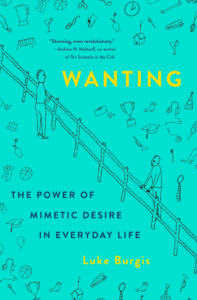
Check out the full notes for “Wanting” by Luke Burgis
I have a better understanding of what I want than I did this morning.
Not specifically what I want. But the concept of wanting things at all. All from the first couple chapters of Luke Burgis’s “Wanting: The Power of Mimetic Desire in Everyday Life”.
Summary: I want things but should probably spend time considering why and where those desires come from.
I’d love to read books, listen to podcasts, and draw notes all day. But I also like income that comes in through my job.
Someday I’d want to make those things intersect.
But why?
(I’m guessing the book won’t tell me the answer directly, but I’m hoping it’ll give me some guidance to frame that properly at all.)
Presumably I’d have more free time to… fill with more desires more likely.
- How’d you find out about “Wanting”, the book?
Luke Burgis was interviewed on Ryan Holiday’s podcast. I checked his book out on Amazon and remembered seeing the cover in the past.
Ok the episode they started talking about mimetic theory and Peter Thiel and Girard.
Now here’s where some of my cogs started turning.
I was in a Write of Passage breakout room and someone mentioned their enthusiasm for Girard and their enthusiasm for another member’s writings about Girard.
No first name mentioned, so I knew (1) this “Girard” person was important and (2) the rest of the cohort is much smarter than me.
After that, I’d notice his name mentioned more and more (like how you notice VW bugs when you’re playing the game where you punch someone in the arm when you see a VW bug), often in discussions about Thiel.
Which all just reminds me of the “That Funke!!!” scene in Arrested Development. Spread the name around the water cooler.
So back then I thought “okay I’ll check out some Girard stuff” and did and saw how dense it was and quickly thought “okay I won’t check out some Girard stuff”.
Back to my comfort zone of books mentioning the marshmallow study.
I was somewhat relieved listening to the Daily Stoic episode because they talk about how unapproachable Girard’s writing can be. A lot of it isn’t meant to be taken at face value.
So I was happy to hear that Burgis wrote this book with people like me in mind. Interested in learning more about memetic theory but looking for some more approachable material.
Some random ramblings before I head off to sleep (a need, not a want—though 8 hours of restful scientifically optimized sleep does creep into the “want” side of things…)
- Ryan Holiday and Luke Burgis discuss book success. The failure in the process happens when you start thinking about how a reader might dislike or attack your writing. Success in the process is laying out the truth as you see it as clearly as possible.
- Still, authors of modern philosophy books aren’t immune to mimetic desires. Of course it’d be great to be a New York Times bestseller. Ryan doesn’t go as far as to say he was jealous, but he does make the comparison between his book “Conspiracy” and “Bad Blood”. One of them was a runaway hit you’ve heard of. The other is an excellent book with my childhood hero Hulk Hogan as the primary pawn.
- Similar to Daniel Kahneman (who seems to go by Danny the way teammates called Kobe 1-syllable “Cobe”) saying he still falls for cognitive traps but might be slightly better at recognizing it’s happening — Burgis hopes to help us understand our desires better, not get rid of them entirely. That’s a fruitless exercise, because at some point you’ll _want_ to _not want_.
Looking forward to reading the rest.

